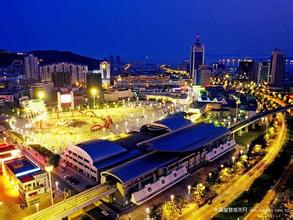A smart city is not an empty concept. It refers to the urban form under the support of a new generation of information technology such as the Internet of Things and cloud computing. It fully utilizes information and communication technology to sense, analyze and integrate key information of urban operations. We will respond intelligently to various needs such as people's livelihood, environmental protection, public safety, and urban services to achieve economic growth, sustainable development, and social progress. At present, many countries around the world are advancing the construction of smart cities. Through the use of high-tech sensors such as sensors and GNSS, smart city construction is becoming a new venue for competitions.
Spain (Barcelona): Sensors make management easier

According to Mariano, head of the sensor project at the Barcelona Communications Institute. Lamarca said that the smart city is one of the most important projects in Barcelona, and the original industrial zone of the Barcelona textile industry is now the most important test site for this project. The small black box on the traffic light over there can send a signal to the receiver in the hands of the nearby blind and trigger the receiver to alert it that it is near the intersection. Lamarca pointed to the road and said.
Did you see the small bump on the ground? That is the parking sensor. As long as the driver downloads a special application, he can know where there is an empty parking space based on the information sent by the sensor. Barcelona's iconic Sagrada Familia is a gathering place for tourists, where a well-established parking sensor system is set up to guide buses.
This is a smart bin with sensors on it that detect if the bin is full. Based on the information from the sensor, the garbage collection center can develop a database to arrange the route of the garbage truck. In addition, the odor sensor is installed in the trash can. If the odor of the trash can exceeds the normal standard, the sensor will give an alarm to remind you.
Our smart city construction projects are not large in scale, but there are many types, some of which are experimental in nature, and some have been further promoted and implemented. As one of the direct participants and principals of the construction of smart cities in Barcelona, Lamarca has its own unique views on the construction of smart cities. Technology and products are dead, but the reality is flexible and flexible. Fully based on practice.
United States (Dubek, Iowa): Internet of Things connects urban resources
On January 28, 2009, Obama, who had just served as President of the United States, met with Peng Mingsheng, the then president of IBM, as the representative of the business and industry leaders. Peng Mingsheng officially proposed to the Obama administration the concept of a smart planet, and proposed to invest in building a new generation of intelligent information infrastructure. In September of the same year, Dubuque City, Iowa and IBM announced that they would build the first smart city in the United States.
The city of Dubuque is beautiful and the Mississippi River runs through the city and is one of the most liveable cities in the United States. With the goal of building a smart city, Dubuque plans to use IoT technology to digitize and connect all of the city's resources (including water, electricity, oil, gas, transportation, public services, etc.) to monitor, analyze and integrate data. In order to respond intelligently to the needs of the citizens and reduce the energy consumption and cost of the city, the city of Dubuque is more suitable for residential and commercial development.
The first step in the city of Dubuque is to install CNC hydropower meters to all households and shops, including low-flow sensor technology to prevent waste from water and electricity leaks. At the same time, an integrated monitoring platform will be set up to analyze, integrate and display the data in a timely manner, so that the use of resources in the whole city can be seen at a glance. More importantly, the city of Dubuque publishes this information to individuals and businesses, giving them a clearer understanding of their energy consumption and a greater sense of responsibility for sustainable development.
South Korea (Seoul): Pushing the government's administrative services intelligently
South Korea is building an eco-friendly, smart city with green, digital and seamless mobile connectivity based on the Internet.
In 2003, the South Korean government launched the “U-Korea” development strategy, hoping to build Korea into a smart society. “U” is shorthand for the English word “Ubiquitous” (ubiquitous). Based on wireless sensors, this development strategy digitizes, networked, visualizes, and intelligentizes all Korean resources to promote economic development and social change in Korea. This national-level macro strategy is realized by building “U-City”.
On the basis of the construction of “U-City”, in June 2011, Seoul released the “Smart Seoul 2015” plan to show the world the ambition of building a smart city in the city. For example, Matsushima, South Korea is also seen by many as a template for a global smart city. This new and smart city is located on an artificial island about 65 kilometers west of Seoul, covering an area of 6 square kilometers. The project began construction in 2000 with a total investment of 35 billion US dollars (about 214.2 billion yuan). Because Songdo's information system is closely linked, critics also call it "the city in the box." For example, in Songdo, the elevator will only start when someone is riding. Telepresence devices are as common as dishwashers in every household. Songdo is expected to be completed in 2015. By then, the number of households in the city will reach 65,000, and the number of people employed in the city will reach 300,000.
Northern Europe: smart traffic reduces congestion and emits less
As early as 2007, the EU proposed and began to implement a series of smart city construction goals. The EU's evaluation criteria for smart cities include six aspects: smart economy, smart environment, smart governance, smart mobility, smart living and smart people. The Nordic countries have something to learn from in improving transportation and promoting energy conservation and emission reduction.
In the case of Stockholm, the capital of Sweden, the city has achieved remarkable results in managing traffic congestion. Specifically, the city has 18 roadside monitors on the road to the city center, using radio frequency identification, laser scanning and automatic photography to achieve automatic identification of all vehicles. With these devices, the city charges a congestion tax on vehicles entering and leaving the city center between 6:30 and 18:30, Monday through Friday, reducing traffic congestion by 25 and reducing greenhouse gas emissions by 40.
Another example is Copenhagen, the capital of Denmark. This city, known as the “City of Bicycles”, has made great achievements in green transportation. In order to encourage the public to use rail transit with the least amount of carbon dioxide emissions, the city will use the overall planning to ensure that citizens can use rail transit within 1 km of their doorstep. The traffic on the 1km road obviously depends on the bicycles with deep foundations. In addition to the construction of three “bicycle highways” and service facilities along the way, they also provide radio frequency identification or GNSS global positioning services for bicycles, and the signal system ensures smooth travel.



 13602604941
13602604941
